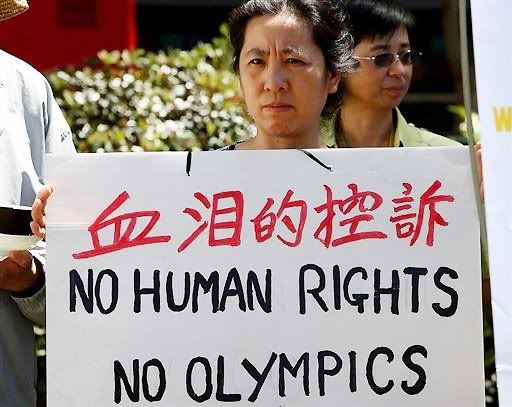Foreign Policy Quiz
 This is a two parter. The first question is to name the country that is the focus of this passage from Reuter's story about the State Department's 2007 Human Rights Report:
This is a two parter. The first question is to name the country that is the focus of this passage from Reuter's story about the State Department's 2007 Human Rights Report:This year ___ was classified among authoritarian countries that are undergoing economic reform and rapid social change but which "have not undertaken democratic political reform," the report said.Did you guess China? Good! (I know; the photos gave it away.)
In ___, controls were "tightened on religious freedom in Tibetan areas and in the Xinjiang Uighur Autonomous Region and the treatment of petitioners in Beijing worsened," the report said.
"The government also continued to monitor, harass, detain, arrest, and imprison activists, writers, journalists, and defense lawyers and their families, many of whom were seeking to exercise their rights under the law," it said."Although the government pursued some important reforms, such as the Supreme People's Court's resumption of death penalty review power in cases handed down for immediate execution, efforts to reform or abolish the reeducation-through-labor system remained stalled," it said.
Now the second question: What did the State Department do as a result of all this?
If you guessed "It removed China from its list of the world's worst human rights violators," you're right! Congratulations! You've won a trip to the gulag of your choice!
Sure, the top ten offenders could give China a run for its money. After all North Korea, Myanmar, Iran, Syria, Zimbabwe, Cuba, Belarus, Uzbekistan, Eritrea and Sudan have nothing much to be proud of in the human rights arena. But with a population of 1.3 billion, China can trounce on more human rights in an afternoon than its competitors can falsely imprison, torture or just plain murder in a month of Sundays. (Remember, no praying allowed on Sundays. Or any other day.)
Obviously, there is some pandering going on here -- most likely an effort to encourage China to get North Korea in tow and de-nuked. If moving them down to 11 on the list of nefarious nations helps, it's worth it, especially since China has proven beyond the shadow of a
Before we go, let's do a little exercise in civics with the top ten:
- North Korea, Communist dictatorship
- Myanmar, Communist junta
- Iran, Islamist theocracy
- Syria, Islamist dictatorship
- Zimbabwe, Socialist dictatorship
- Cuba, Communist dictatorship
- Belarus, Soviet anachronism, Communist style
- Uzbekistan, Soviet anachronism, Islamist style
- Eritrea, Islamist dictatorship
- Sudan, Islamist theocratic dictatorship
Labels: China, Foreign policy, Human Rights, North Korea




<< Home